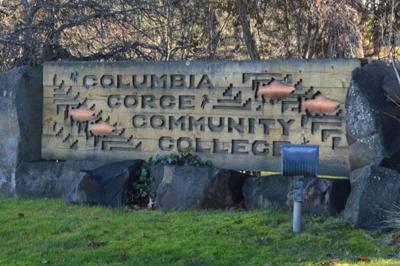THE GORGE — Employees at Columbia Gorge Community College (CGCC), specifically its local chapter of the American Federation of Teachers (AFT) union, are asking their administration for better pay, workload equity, and expanded representation to cover academic professionals.
Bargaining began on Jan. 30, and may last through summer, said Leigh Hancock, union communications officer and CGCC literature department professor.
Included in the Collective Bargaining Unit are 84 faculty who pay union dues and 16 classified staff, like administrative assistants and custodial workers, who don’t pay dues. Other employees in academic advising, student services and outreach, called academic professionals, currently have no union protection.
Since January, AFT has collected cards from more than half of CGCC’s 52 academic professionals wanting to join the union and turned them over to the Employee Relations Board on Feb. 1, according to Kisa Clark, Oregon field representative for the AFT.
The administration denied the union’s request to extend coverage to academic professionals on Feb. 6.
Some classified staff, covered by the union, are not making a living wage, Hancock said. CGCC has the lowest-paid faculty of any Oregon community college, according to previous bargaining agreements.
At its last bargaining session in 2022, CGCC raised classified staff pay scales by 20%, added an annual increase of 3%, and incorporated cost of living adjustments, reported CGCC Public Information Officer Tom Penberthy.
“In recent months, we have surveyed our membership and held open discussions and contract review meetings. One message we have heard loud and clear from our members is that there is a lack of trust in leadership at CGCC,” the union wrote in its Jan. 30 opening statement, which is public. “While our Strategic Plan endeavors toward shared prosperity, belonging, integrity, and open communication, there is a marked belief among CGCC employees that these principles exist in word but not in deed. Faculty and staff feel under-supported, and institutional dysfunctions create excess unpaid labor.
“With a new President, Mission, Vision, and Strategic Plan, and the departure of multiple members of the Administrative team since our last negotiation, we see potential for a positive shift in culture at CGCC.”
In response, Penberthy told Columbia Gorge News via email the college is “committed to understanding and addressing concerns raised by all CGCC employees. To better understand this question, the administration will seek clarification from the union and looks forward to working collaboratively to resolve specific issues.”
The response also noted bargaining has proceeded “respectfully” on both sides.
As for money, the living wage for one childless working adult in Wasco County is about $24.89, according to the Massachusetts Institute of Technology’s calculation. If that person has a partner, also working, living wage for them is about $16.80.
Classified staff get paid an hourly wage between $17.87 and — after at least 14 years’ employment — $36.58.
According to CGCC’s publicly-available previous bargaining agreements, starting pay for faculty is $47,228, against an average of $59,550 for starting pay at other community colleges across Oregon. CGCC’s top pay is $83,745, compared to a state-wide average of $101,372.
That’s a difference of $12,322 and $17,627 between CGCC and Oregon’s average, respectively.
“Rising PERS (Public Employees Retirement System) rates and stagnant state funding to higher education pose significant challenges for community colleges statewide. CGCC continues to advocate for increased funding at the state level while implementing measures such as wage adjustments and professional development opportunities,” said the administration’s collective response to Columbia Gorge News, emailed by Penberthy.
The college’s response said it “respects the formal process outlined for unionization,” noting the academic professionals did not petition directly themselves.
The union keeps academic professionals’ requests and interest cards confidential to ensure their privacy and protect from any retaliation, Clark said.
The union is now working with the Oregon Employment Relations Board, which will decide whether union coverage will be extended to academic professionals.
Some other Oregon community colleges, such as CGCC’s former parent college Portland Community College, offer union coverage to academic professionals.



















Commented